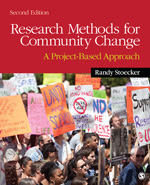Research Methods for Community Change
A Project-Based Approach
- Randy Stoecker - University of Wisconsin - Madison, Chile
“In its community-based focus and careful attention to the micro, inter-group and institutional dynamics of project centered research in and with communities, this text stands alone. I am not aware of another text that provides such an in-depth framework and rationale for community-centered research practice, as well as grounded details and guidance on the opportunities and challenges in integrating research more effectively and equitably through the different stages of the project cycle.”
'Research Methods for Community Change is a valuable text for undergraduate and graduate students alike. Readers seeking to understand new directions in social science research generally, or embark on their own community-based research will be well served by the mix of theory and practice, real-world examples, and student-friendly tone. [...] He is to be praised for offering a means for the next generation to engage in the communities in which they live, rather than remain holed up in a computer lab somewhere, trying in vain to find meaningful correlations instead of simply asking more meaningful and community-informed questions'
I chose this "textbook" because it is the "BEST FIT" for my teaching philosophy and practice involving project based learning through community focused action research projects by criminal justice, social work and gerontology students, all of whom take a common research methods course in their junior year titled "Research Methods for the Human Services."
PSY 4339: Seminar in Community Psychology integrates applied research knowledge.
Excellent description of community based research. Great insights into the challenges of doing community research and working in academia.
Focus too narrow for my course, i.e., not the best fit for an introductory social work research course. Great supplement to other texts for students interested in community-based research.
I did not formally adopt, but have recommended it to students interested in PAR and community-based programming/research
Book is aligned with the most current issues facing community change and allows for class discussion based on topic areas highlighted in book.
Good basic overview of participatory action research and approaches to conducting research with communities.
Currently using this text, excellent for the class of international development and economic development graduate students.
A lot has happened in the five years since this book was first published, and a lot has stayed the same. I changed institutions, going from a low-ranked open enrollment university in a decimated rust-belt town to a high-ranked research university in a vibrant state capitol. I've brought my past five years of experience and knowledge into the book, reflecting on the most recent effective projects out there, and my learnings from my new mentors in Wisconsin and elsewhere. My journey along this path as an academic trying to practice effective community engagement is, after all, five years older than it was when the first edition of this volume came out. Finally, it is important for you the reader to know that I am composing this second edition in the midst of the most powerful political upheaval in my conscious lifetime. In February of 2011 the newly elected governor of Wisconsin, along with the new state legislature—all controlled by Republicans—started ramrodding a series of right-wing bills through the statehouse. The most incendiary of those bills was one that would reduce the state budget by cutting the benefits of state workers and practically eliminating public employee unions. The legislation produced an uprising that led to thousands of people occupying the capitol for a three-week period, tens of thousands of people marching in the streets, thousands of people across the state with petitions to recall state senators, and a string of court cases that currently has stopped the legislation from taking effect. In the midst of this uproar, which we expect to continue yet for months, I am revising this book about using participatory action research in communities. And I have been witnessing countless examples of such research as students and other activists researched how to keep the capitol occupied, conduct successful recall campaigns, and block legislation that would roll back Wisconsin's progressive tradition by a century. So you will see some of my consequently raised consciousness and much deeper understanding of the power dimensions of the research process in these pages. You will also see the influence in some of the art in the book. My niece, Eden Raduege, is a skilled anime artist, and attended a number of the demonstrations here in Madison. I commissioned her for the art at the beginning of each chapter, drawing on both her own rising consciousness and her graphic design talents.

